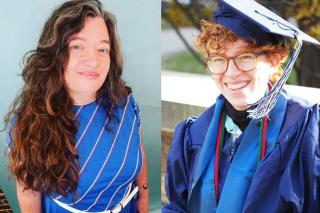During high school, Devin Ryan ’21 toured Simmons with their mother, Misty Neader. Ryan, who was assigned female at birth and identifies as nonbinary, was drawn to Simmons as a women-centered institution.
“I wanted to go where my voice could be heard and respected,” says Ryan, who was also intrigued by the location. “I grew up visiting the Boston area and always wanted to live up here,” says Ryan, who grew up in Texas. “I liked that Simmons isn’t a massive school. Classes where I wouldn’t get direct communication with the professor didn’t appeal to me.”
Ryan majored in Biology at Simmons and joined a community of LGBTQIA+ students, eventually changing their preferred pronouns during their Simmons studies. “In Texas, I wasn’t exposed to that community. I was very quiet about [my identity]. It felt unsafe to express it fully. Simmons allowed me to express myself.”
Time for a Career Change
Meanwhile, someone close to Ryan was also inspired by that campus tour: their mother, Misty Neader ’25MSW. “I love that Devin loved Simmons, and I loved watching them grow there,” says Neader. “But I knew I wanted to go to Simmons as soon as I toured the campus with Devin.” Neader recalls learning that Simmons School of Social Work was the first institution to offer training for clinical social workers. “I thought, if I have the opportunity [to attend], why not try?”
Once Ryan graduated in 2021, Neader saw it as a perfect time for her to pursue her own career goals. “My midlife crisis [resulted in] a Master’s degree [in Social Work],” she quips, noting that she was also drawn to the intimate scale at Simmons, having attended a large state university for her Bachelor’s degree. “I knew I wanted a more personal relationship with my professors,” says Neader. “I didn’t want to feel intimidated to ask questions, and wanted as much time with them as I could have. I want to get everything I can out of this degree.”
Neader raised Ryan to be a “passionate feminist,” though the political climate in Texas didn’t always match their beliefs. “Being able to attend Simmons online has opened up a whole new world for me,” says Neader. “We always told Devin that college is a time for growth. Simmons is that for me, too.”
Professional Preparation at Simmons
Ryan landed a full-time position as Research Associate at Dana-Farber Cancer Institute before graduation. “I felt like I could work in this male-dominated field, thanks to Simmons,” says Ryan.
Their current research focuses on targeting the protein in cancer cells in the hopes of eventually developing medications with fewer side effects. While at Simmons, Ryan gained extensive lab experience: conducting cloning procedures in the lab as a Research Assistant for Associate Professor Eric Luth, and through a part-time job preparing the lab for biology classes. “I gained so much confidence at Simmons that now, I know that I know what I’m talking about,” says Ryan. “I wouldn’t be as independent or strong as I am if not for the education and empowerment I received at Simmons.”
Still in the midst of her studies, Neader is already impressed with what she has gained through coursework and her practicum, a paid virtual internship with New Day Education, a counseling service organization in Texas. Offering online clinical counseling eliminates barriers for people to attend their appointments. “[I find that] people are less nervous and more open because they are comfortable at home,” she notes.
Currently focused on substance use counseling, Neader plans to lean into mental health counseling, tying underlying issues to substance use. She has shared what she has learned about harm reduction [an evidence-based approach to engage people who use drugs to equip them with life-saving tools; a key pillar in the U.S. Department of Health and Human Services' Overdose Prevention Strategy] with her practicum colleagues, hoping to influence services in Texas to adopt a less punitive approach. Neader is also interested in advocating for policy changes once she achieves her clinical license, and plans to use her social work degree to work with reintegrating people into society after incarceration.
“I want to help people rebuild after being incarcerated for multiple years,” says Neader, who earned a Bachelor’s degree in criminal justice and has worked in substance abuse programs for incarcerated individuals. Her Master’s in Social Work is a way to combine all of these interests.
A Simmons Community: On Campus and Online
Neader is thankful for the support she’s received throughout the online program. “I’m not afraid to ask a question or say that I’m struggling,” she says. “The professors take the time to meet with you. The time I get with professors and classmates is valuable to me.”
Ryan, who finished their degree in the midst of COVID-19 restrictions, can attest to the impact of relationships with faculty. “I had permission to do research at the lab [during the pandemic]. I would see [faculty members] and their eyes would light up with joy,” they recall. “It was emotional on my last day in the lab. I said goodbye to Associate Professor Jane Lopilato and we took a photo. It felt like an ending that I didn’t think I was going to get. Simmons professors really care.”
As Ryan plans for future career goals, they are happy Neader has a chance to focus on her own career. “It’s been really cool to see her pursue her Master’s!” says Ryan. “She and my Dad sacrificed a lot to raise me and give me opportunities. Seeing her do this for herself has been awesome.”
That pride goes both ways. “For our whole life together, I’ve learned along with Devin and I’ve learned with them,” says Neader. “I hope they learn from me that there is never an age limit to do things like this. Education isn’t just about employment. I am taking classes that interest me, [to build] a career that I can do for the rest of my life.”

